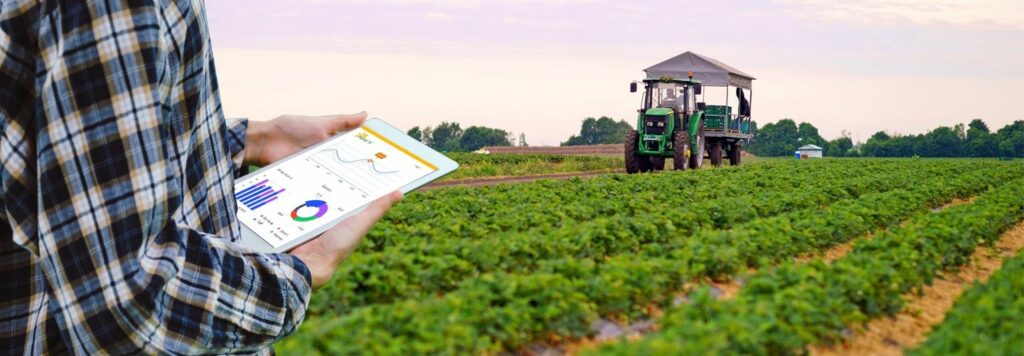Why Farm Analytics is Pivotal in Precision Farming and Agriculture 5.0

Farm analytics is emerging as a popular trend in the agriculture industry, following other trends such as precision agriculture and smart farming. Leading agribusinesses are not only resorting to state-of-the-art farm management platforms, but they are also bolstering the adoption of smart agriculture management systems integrated with farm analytics.
FarmERP, in its quest for transforming agriculture to smart agriculture and lead businesses towards Agriculture 5.0, offers advanced farm analytics tools that can further facilitate precision farming and boost farm productivity in the coming years. Read on to learn more about how farm analytics will prove to be the cornerstone of the agriculture industry, helping agribusinesses gain a competitive edge in the global market.
The convergence of agriculture and information technology is not new in the era of Industry 4.0. The last decade has created multiple new opportunities for agribusinesses that implement advanced agriculture technologies across major agricultural operations right from pre-production farm planning, harvesting, climate resilient production, post-production, to farm machinery maintenance.
However, modern agribusinesses are bolstering the use of advanced technologies such as Big Data in smart agriculture to move towards the trend of Agriculture 5.0. FarmERP’s agriculture management platform mainly focuses on wholesome growth of the agribusiness with the implementation of farm analytics driven by next-generation agriculture technologies. It does not only improve the process of data-based decision making but also help in gauging the current productivity matrices and improving marketing campaigns as well.
By emphasizing the upstream connections for agribusinesses that link agricultural input dealers, suppliers, retailers, and farmers, FarmERP’s farm analytics tool can efficiently boost impactful innovations happening across the value chain. Here are the 5 most important aspects of smart agriculture and farm analytics that can help agribusinesses lead towards smart agriculture and remain ahead of the game on the international platform.
1. Cost Analytics: A Game Changer in Farm Analytics and Smart Farming
The farming and agriculture industry is moving rapidly towards adopting an approach driven by advanced technologies such as Artificial Intelligence, Internet of Things, and Machine Learning. Farms that are actively integrated with tech-based agriculture machinery are seen to be showing exceptional advantages such as increased productivity, and mainly reduction in production costs and improvements in savings with minimal efforts.
One of the most prominent advantages of implementing farm analytics tools that are integrated with the Internet of Things-based agriculture technologies is higher crop yields at minimal costs. In addition, as the cost of technology continues to decrease in the field of smart agriculture, the adoption of farm analytics for precision farming in modern agriculture businesses is expected to boom in the coming years.
Taking this into consideration, FarmERP enables farming businesses to avail three primary benefits of leveraging cost benefit analytics – assessing the adaptation approaches, investigating various costs, and identifying the most economic and effective business options depending on the data acquired by its farm analytics module.
2. Evidence-based Farmer Analytics for Resource Management
The rise of precision farming and data analytics in the smart agriculture industry has triggered the adoption of innovation agriculture technologies to contribute to transforming agriculture. Farm data management is emerging as a new branch of data analytics and farm management platforms that can eventually. Recently, multiple agribusinesses have realised and acted upon the fact that farm analytics and farmer management can be pivotal in village transformation projects as well.
Farm analytics are also looked at as a modern tool for agribusinesses to streamline business processes that revolve around facilitating deployment, development, and maintenance of resources. In recent years, human resources – farmer management has emerged as an important aspect of agriculture management and farm analytics. With the implementation of advanced agriculture technologies, efficient management of human resources can be simplified for modern agribusinesses.
FarmERP’s advanced farm management system offers a special module for farm analytics that features specific techniques for making the task of farmer management less tedious. Especially for businesses involved in the area of contract farming, efficient human resource management is highly crucial to ensure high productivity across all farms situated at different locations. FarmERP offers an advanced farmer analytics module in its farm management system that can reflect important data in the form of business insights and through multiple dashboards.
3. Machinery Analytics can Reduce High Maintenance Costs and Unexpected Breakdowns
With the implementation of FarmERP’s farm analytics techniques, machinery maintenance and analytics can be carried out across the agriculture supply chain management operations. Consequently, this can lead to serious cost savings and enable farming businesses to manage risks better with the implementation of smart farm management techniques easily in the coming years.
FarmERP offers a comprehensive machinery analytics module that can help farmers and other end users to efficiently utilise data and implement a robust machinery management system across their farms. Especially for FPOs and FPCs, FarmERP’s machinery analytics tool can prove highly beneficial as it simplifies machinery maintenance across all farms through the integrations of advanced technologies as well as sensors with machineries. This can ultimately bolster the productivity and enable end users to implement precision farming successfully.
4. Fertilizer Analytics can Bolster Profitability and Quality of Yields
Precision farming is gaining a massive momentum among modern agribusinesses as they are farm producers who are looking into yield quality more seriously. Furthermore, tightening quality standards for agri-products largely affects their export potential and this ultimately impacts the profitability of businesses.
With advanced agriculture technologies such as Big Data, advanced fertilizer analytics can be implemented that can predict the right use of appropriate fertilizers in the right qualities in order to maintain the export quality of agri-products. FarmERP’s farm analytics tool can further amplify the profitable results through its fertilizer analytics that is developed at the base of the fact that every combination of crop and soil is different, and they require specific types of nutrients.
5. Pack House & Inventory Analytics to Maintain Supply-Demand Balance
For the modern supply chain operations in the agriculture industry, structured inventory and packhouse management has emerged as one of the most important factors in maintaining a healthy supply-demand balance. With the advent of smart agriculture technologies, most agribusinesses are resorting to advanced farm management platforms to better manage inventory and pack house operations.
FarmERP’s farm analytics module can simply automate various operations involved in inventory and pack house management by implementing advanced data analytics tools. Automating timely business processes that revolve around the complexities of pack house management as well as inventory finances.
In addition to this, inventory and pack house analytics integrated with FarmERP also enable agribusinesses to maintain complete agricultural traceability across the entire value chain. It also ensures precision of traceability and complete accuracy in monitoring systems, which ultimately leads to higher supply chain efficiency and enables businesses to be acceptable for compliance purposes.
